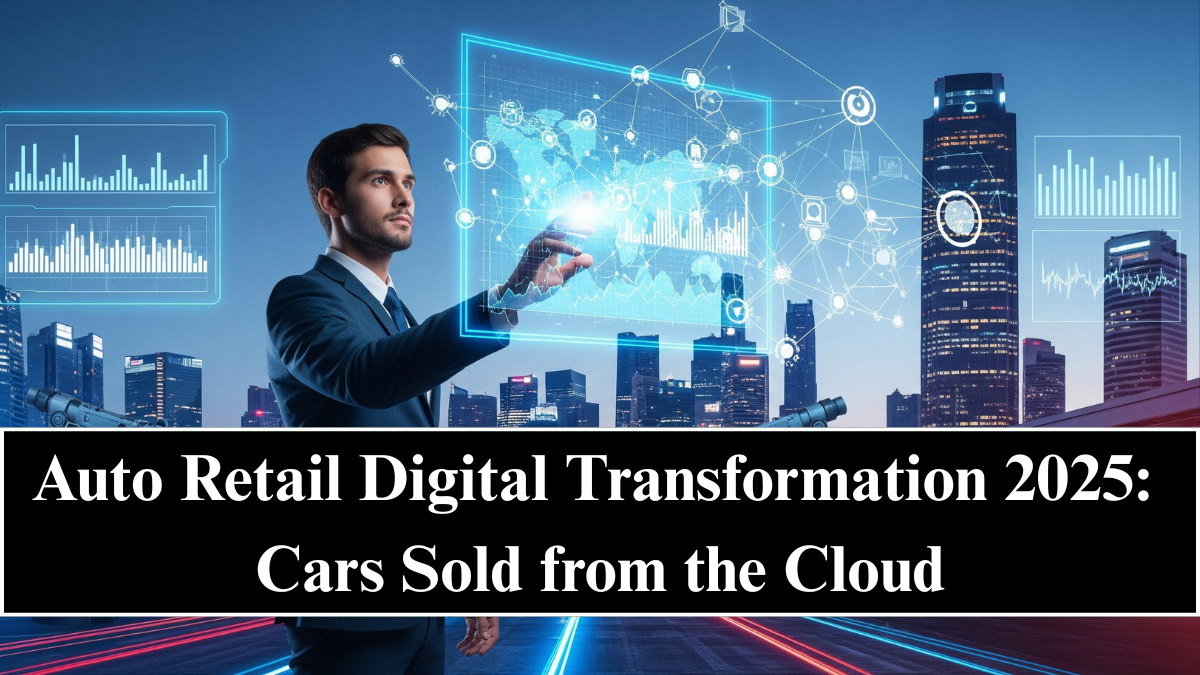The automotive retail industry in 2025 is experiencing its most radical transformation in decades. Traditional dealership visits and long negotiation cycles are being replaced by fully digital car-buying journeys, where consumers can explore, configure, finance, and purchase vehicles entirely online.
This digital transformation—accelerated by eCommerce innovation, AI personalization, and augmented reality (AR)—has made the auto retail experience faster, transparent, and more customer-centric than ever before.

The Shift from Showrooms to Screens
Five years ago, buying a car meant multiple showroom visits. Today, consumers are completing the entire process on their smartphones or laptops. Auto retailers are adapting to this new normal with:
-
Virtual showrooms offering 360° car views and interior simulations.
-
AR-enabled test drives, allowing users to experience vehicles digitally.
-
Online financing and trade-in tools for instant approvals.
-
AI-driven chatbots providing real-time assistance.
-
Home delivery and remote documentation to finalize sales.
The shift isn’t just about convenience—it’s about empowering customers with choice and control, creating a seamless, end-to-end digital journey.
Factors Driving Auto Retail’s Digital Revolution
Several key factors have accelerated the adoption of digital-first retail in 2025:
-
Post-pandemic consumer behavior: Buyers prefer contactless experiences.
-
EV boom: Electric car buyers rely more on research, range tools, and virtual comparisons.
-
AI & data analytics: Personalized recommendations increase customer engagement.
-
OEM–dealer collaboration: Automakers now support digital platforms instead of competing with them.
-
Omnichannel integration: Physical showrooms act as experience centers, while transactions occur online.
This transformation has blurred the lines between automakers, dealers, and digital marketplaces—creating a unified retail ecosystem.
The Role of AI and Data in Auto Retail
Artificial Intelligence has become the driving force behind digital retail transformation. Modern car-buying platforms analyze customer behavior and preferences to deliver personalized recommendations.
Here’s how AI enhances auto retail:
-
Predictive analytics: Anticipates buying intent and suggests models.
-
Dynamic pricing algorithms: Adjust vehicle offers based on demand and availability.
-
Conversational AI: Provides 24/7 customer assistance through virtual agents.
-
Visual configurators: Let users design cars in real-time with preferred color, trim, and accessories.
-
Finance automation: Approves loans instantly through AI-based risk assessment.
By combining data, machine learning, and automation, the buying process has become faster, smarter, and entirely customer-driven.
Virtual Showrooms: The New Automotive Frontline
The concept of virtual showrooms has revolutionized how consumers experience vehicles. In 2025, nearly every automaker operates immersive digital spaces accessible via web or VR headsets.
Key features include:
-
Interactive 3D car models with zoom, rotation, and customization.
-
Augmented Reality previews placing virtual cars in a buyer’s driveway.
-
Live consultations with sales experts through video calls.
-
Virtual test drives simulating real driving experiences.
This hybrid approach allows users to explore vehicles comfortably while still receiving the personalized support once exclusive to dealerships.
How Online Auto Marketplaces Are Evolving
Online car marketplaces are no longer just listing platforms—they’ve become full-service ecosystems.
In 2025, platforms like Cars24, Carvana, and Spinny offer complete digital pipelines, including inspection, financing, insurance, and doorstep delivery. Manufacturers have also entered the eCommerce space directly, selling vehicles via their own portals.
The most innovative platforms feature:
-
Subscription models for short-term car access.
-
Certified pre-owned EV sections with verified battery health data.
-
AI-driven price transparency tools to eliminate negotiation stress.
The entire experience mirrors modern retail—efficient, transparent, and trust-based.
The Benefits of Digital Auto Retail
For both consumers and automakers, digital transformation brings clear advantages:
-
Convenience: Browse, compare, and purchase vehicles anytime, anywhere.
-
Transparency: AI-based pricing and instant financing ensure fairness.
-
Cost efficiency: Dealers reduce overheads through lean, digital operations.
-
Sustainability: Less paper, fewer commutes, and lower carbon footprints.
-
Wider reach: Automakers connect directly with global customers.
The result is a more inclusive automotive ecosystem, where technology bridges the gap between brand experience and consumer expectation.
Challenges in the Digital Retail Shift
Despite progress, the industry faces ongoing challenges:
-
Data privacy concerns: Protecting sensitive financial and user data.
-
Legacy systems: Many dealers still depend on outdated infrastructure.
-
Digital skill gaps: Training staff to handle virtual customer interactions.
-
Trust barriers: Some buyers still prefer physical test drives before purchase.
However, the introduction of AI-assisted authenticity verification and secure digital payment frameworks is helping overcome these concerns.
The Future of Auto Retail
By 2030, digital retail will dominate the automotive industry. Physical dealerships will evolve into brand experience hubs—places for test drives, education, and after-sales support, while sales and transactions remain online.
Future innovations include:
-
Metaverse car showrooms offering hyper-realistic immersive buying experiences.
-
Voice-based car shopping integrated with AI assistants.
-
Smart contracts on blockchain to simplify ownership transfer.
-
Real-time car customization through AR-enabled holographic design tools.
As consumers continue to prioritize convenience and personalization, the auto retail experience will become fully digital, data-driven, and connected to the cloud.
FAQs
What is digital transformation in auto retail?
It’s the shift from traditional dealerships to online, data-driven, and AI-powered platforms that allow car buying and selling through digital channels.
How does AI help in car sales?
AI personalizes recommendations, automates financing, and predicts consumer preferences for a faster, smarter buying experience.
What are virtual showrooms?
They are interactive online platforms where customers can explore, customize, and test cars digitally without visiting a physical dealership.
Are people really buying cars online in 2025?
Yes, online car purchases now represent a major share of total vehicle sales, especially for EVs and premium models.
What’s the future of auto retail?
The future is omnichannel—a blend of digital platforms, immersive showrooms, and connected experiences powered by AI and cloud technologies.
Click here to know more.
